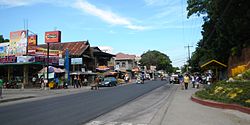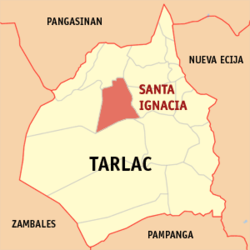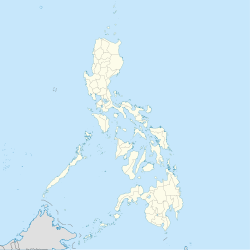Santa Ignacia, officially the Municipality of Santa Ignacia (Pangasinan: Baley na Santa Ignacia; Ilocano: Ili ti Santa Ignacia; Tagalog: Bayan ng Santa Ignacia), is a municipality in the province of Tarlac, Philippines. Santa Ignacia has a total land area of 14,607 hectares (36,095 acres). According to the 2020 census, it has a population of 51,626 people.[3]
Santa Ignacia | |
|---|---|
| Municipality of Santa Ignacia | |
 Downtown area | |
| Nickname: Nacia | |
 Map of Tarlac with Santa Ignacia highlighted | |
Location within the Philippines | |
| Coordinates: 15°37′N 120°26′E / 15.62°N 120.43°E | |
| Country | Philippines |
| Region | Central Luzon |
| Province | Tarlac |
| District | 1st district |
| Named for | Ignacia del Espíritu Santo |
| Barangays | 24 (see Barangays) |
| Government | |
| • Type | Sangguniang Bayan |
| • Mayor | Nora T. Modomo |
| • Vice Mayor | Nathaniel L. Tan |
| • Representative | Carlos O. Cojuangco |
| • Electorate | 32,153 voters (2022) |
| Area | |
• Total | 146.07 km2 (56.40 sq mi) |
| Elevation | 48 m (157 ft) |
| Highest elevation | 115 m (377 ft) |
| Lowest elevation | 21 m (69 ft) |
| Population (2020 census)[3] | |
• Total | 51,626 |
| • Density | 350/km2 (920/sq mi) |
| • Households | 12,717 |
| Economy | |
| • Income class | 2nd municipal income class |
| • Poverty incidence | 14.00 |
| • Revenue | ₱ 204.3 million (2020) |
| • Assets | ₱ 509.7 million (2020) |
| • Expenditure | ₱ 149 million (2020) |
| • Liabilities | ₱ 95.05 million (2020) |
| Service provider | |
| • Electricity | Tarlac 1 Electric Cooperative (TARELCO 1) |
| Time zone | UTC+8 (PST) |
| ZIP code | 2303 |
| PSGC | |
| IDD : area code | +63 (0)45 |
| Native languages | Pangasinan Ilocano Tagalog Kapampangan |
| Website | santaignaciatarlac |
Etymology
editThe town is named after the founder of the Religious of the Virgin Mary Order, the Venerable Mother Ignacia del Espiritu Santo.
Geography
editSanta Ignacia is 26 kilometres (16 mi) from provincial capital Tarlac City and 150 kilometres (93 mi) from Manila.
Barangays
editSanta Ignacia is politically subdivided into 24 barangays. [5] Each barangay consists of puroks and some have sitios.
There are two barangays (highlighted in bold) which considered as urban while the rest of 22 barangays are rural.
Climate
edit| Climate data for Santa Ignacia, Tarlac | |||||||||||||
|---|---|---|---|---|---|---|---|---|---|---|---|---|---|
| Month | Jan | Feb | Mar | Apr | May | Jun | Jul | Aug | Sep | Oct | Nov | Dec | Year |
| Mean daily maximum °C (°F) | 30 (86) |
31 (88) |
33 (91) |
35 (95) |
33 (91) |
31 (88) |
30 (86) |
29 (84) |
29 (84) |
30 (86) |
31 (88) |
30 (86) |
31 (88) |
| Mean daily minimum °C (°F) | 19 (66) |
19 (66) |
20 (68) |
22 (72) |
24 (75) |
24 (75) |
24 (75) |
24 (75) |
23 (73) |
22 (72) |
21 (70) |
20 (68) |
22 (71) |
| Average precipitation mm (inches) | 3 (0.1) |
2 (0.1) |
5 (0.2) |
10 (0.4) |
80 (3.1) |
107 (4.2) |
138 (5.4) |
147 (5.8) |
119 (4.7) |
70 (2.8) |
26 (1.0) |
8 (0.3) |
715 (28.1) |
| Average rainy days | 2.0 | 1.7 | 2.7 | 4.6 | 16.1 | 20.8 | 24.0 | 23.0 | 21.4 | 15.5 | 8.0 | 3.2 | 143 |
| Source: Meteoblue[6] | |||||||||||||
Demographics
edit| Year | Pop. | ±% p.a. |
|---|---|---|
| 1903 | 1,911 | — |
| 1918 | 5,382 | +7.15% |
| 1939 | 10,993 | +3.46% |
| 1948 | 14,061 | +2.77% |
| 1960 | 15,512 | +0.82% |
| 1970 | 20,775 | +2.96% |
| 1975 | 23,157 | +2.20% |
| 1980 | 25,224 | +1.72% |
| 1990 | 30,470 | +1.91% |
| 1995 | 34,658 | +2.44% |
| 2000 | 38,301 | +2.17% |
| 2007 | 43,560 | +1.79% |
| 2010 | 43,787 | +0.19% |
| 2015 | 47,538 | +1.58% |
| 2020 | 51,626 | +1.64% |
| Source: Philippine Statistics Authority[7][8][9][10] | ||
In the 2020 census, the population of Santa Ignacia, Tarlac, was 51,626 people,[3] with a density of 350 inhabitants per square kilometre or 910 inhabitants per square mile.
Economy
editPoverty incidence of Santa Ignacia
5
10
15
20
25
30
2006
23.90 2009
21.82 2012
12.69 2015
15.03 2018
5.53 2021
14.00 Source: Philippine Statistics Authority[11][12][13][14][15][16][17][18] |
Gallery
edit-
Our Lady of Fatima Parish Church of Santa Ignacia
-
Town hall
-
Town hall
References
edit- ^ Municipality of Santa Ignacia | (DILG)
- ^ "2015 Census of Population, Report No. 3 – Population, Land Area, and Population Density" (PDF). Philippine Statistics Authority. Quezon City, Philippines. August 2016. ISSN 0117-1453. Archived (PDF) from the original on May 25, 2021. Retrieved July 16, 2021.
- ^ a b c Census of Population (2020). "Region III (Central Luzon)". Total Population by Province, City, Municipality and Barangay. Philippine Statistics Authority. Retrieved 8 July 2021.
- ^ "PSA Releases the 2021 City and Municipal Level Poverty Estimates". Philippine Statistics Authority. 2 April 2024. Retrieved 28 April 2024.
- ^ "Province: Tarlac". PSGC Interactive. Quezon City, Philippines: Philippine Statistics Authority. Retrieved 12 November 2016.
- ^ "Santa Ignacia: Average Temperatures and Rainfall". Meteoblue. Retrieved 5 May 2020.
- ^ Census of Population (2015). "Region III (Central Luzon)". Total Population by Province, City, Municipality and Barangay. Philippine Statistics Authority. Retrieved 20 June 2016.
- ^ Census of Population and Housing (2010). "Region III (Central Luzon)" (PDF). Total Population by Province, City, Municipality and Barangay. National Statistics Office. Retrieved 29 June 2016.
- ^ Censuses of Population (1903–2007). "Region III (Central Luzon)". Table 1. Population Enumerated in Various Censuses by Province/Highly Urbanized City: 1903 to 2007. National Statistics Office.
- ^ "Province of Tarlac". Municipality Population Data. Local Water Utilities Administration Research Division. Retrieved 17 December 2016.
- ^ "Poverty incidence (PI):". Philippine Statistics Authority. Retrieved December 28, 2020.
- ^ "Estimation of Local Poverty in the Philippines" (PDF). Philippine Statistics Authority. 29 November 2005.
- ^ "2003 City and Municipal Level Poverty Estimates" (PDF). Philippine Statistics Authority. 23 March 2009.
- ^ "City and Municipal Level Poverty Estimates; 2006 and 2009" (PDF). Philippine Statistics Authority. 3 August 2012.
- ^ "2012 Municipal and City Level Poverty Estimates" (PDF). Philippine Statistics Authority. 31 May 2016.
- ^ "Municipal and City Level Small Area Poverty Estimates; 2009, 2012 and 2015". Philippine Statistics Authority. 10 July 2019.
- ^ "PSA Releases the 2018 Municipal and City Level Poverty Estimates". Philippine Statistics Authority. 15 December 2021. Retrieved 22 January 2022.
- ^ "PSA Releases the 2021 City and Municipal Level Poverty Estimates". Philippine Statistics Authority. 2 April 2024. Retrieved 28 April 2024.
External links
edit- Santa Ignacia Profile at PhilAtlas.com
- Official website
- Town History
- Philippine Standard Geographic Code
- Philippine Census Information



